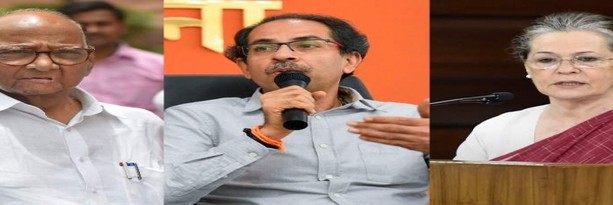
The day-long negotiations between the Congress, NCP and the Shiv Sena leaders on Thursday appeared to have taken Maharashtra closer to a non-BJP government with the leaders declaring that the draft Common Minimum Program (CMP) had been finalized.
“You certainly can say that a non-BJP Government in Maharashtra is possible. Once the top leadership reach a consensus, we shall initiate negotiations on power-sharing,” Senior Congress leader Vijay Wadettiwar said after the joint meeting of the parties concluded.
Congress president Sonia Gandhi and NCP chief Sharad Pawar are scheduled to meet in Delhi on Sunday (November 17) when the draft is likely to be cleared.
Leaders from the three parties had two different sets of meetings earlier in the day and came together at Chhagan Bhujbal’s office in Bandra in the evening where the draft CMP was discussed and finalised.
Shiv Sena leaders Eknath Shinde and Sudhir Desai, NCP’s Jayant Patil, Nawab Malik and Chhagan Bhujbal and Congress’ Manikrao Thakre, Prithviraj Chavan and Vijay Wadettiwar were present in the discreet meeting, far from the media glare.
The leaders discussed policies as well as aims and objectives in sectors like urban development, infrastructure and farmers’ plight, sources have said.
On Friday, Sena spokesperson and MP Sanjay Raut said that the next government in the state will be led by his party and the common minimum programme (CMP) being worked out along with the Congress and the NCP will be in the "state's interest".
The Uddhav Thackeray-led saffron party will lead the government in Maharashtra for the next "25 years" and not just five years, claimed Raut while talking to reporters here.
The Rajya Sabha MP, who turned 58 on Friday, was responding to questions on whether his party will share the chief minister's post with the NCP and the Congress, its allies in the prospective three-party government.
"Talks are on with the Congress and the NCP to work out a common minimum programme which will be in the interest of the state and its people," he said.
"Whether it is a single-party government or an alliance, an agenda for governance is necessary. There are infrastructure projects to be taken forward, (and issues related to) drought, unseasonal rains (are to be tackled).
"Those coming with us are experienced administrators. We will benefit from their experience," he said.
Regarding alliance with the Congress, the Sena's political rival till recently, Raut said leaders of the country's oldest party have contributed to freedom struggle as well as development of Maharashtra.
Asked whether the Sena will share the CM's post on a rotational basis in the next dispensation, Raut said, "We want to have the chief minister's post for the next 25 years. The Shiv Sena will provide leadership to the state no matter who tries best to stop it."
ALSO READ | President's rule in Maharashtra a 'scripted act', alleges Shiv Sena
The firebrand Sena leader said his party's relation with Maharashtra is permanent and not temporary.
"Our party is active in the state's politics for 50 years," he said.
The Shiv Sena was founded by Bal Thackeray in 1966.
Asked if the Sena, post-tie-up with the Congress-NCP, will give up its demand for the Bharat Ratna for Hindutva ideologue Veer Savarkar and accept Muslim reservation, Raut evaded a direct reply and said, "We know the source of such speculation."
To a query whether a power-sharing formula envisaging 14 portfolios each for the NCP and the Sena, and 12 for the Congress has been decided (as being speculated in media), he declined to disclose details of the proposed coalition arrangement between the three parties.
"You don't worry about power-sharing. Uddhavji (Sena chief Uddhav Thackeray) is capable of taking decisions," said the politician-journalist, who is also the executive editor of Sena mouthpiece 'Saamana'. Asked how the Sena, a party identified with Hindutva politics and "anti-Congressism", will adjust with a non- ideological partner like the Congress, he said, "What is ideology? We are working on a common minimum programme for the state's welfare.
"Vajpayee (BJP stalwart and ex-PM Atal Bihari Vajpayee) headed an alliance of parties who came together on a common minimum programme. In Maharashtra, Sharad Pawar had led a Progressive Democratic Front (PDF) government (1978-80) of which the Jan Sangh, the BJP's earlier avatar, was a part."
"There have been instances earlier where parties of different ideologies have come together," he said, justifying Sena's efforts to cobble up a ruling coalition with the Congress and the NCP, against whom the Sena fought the last month's assembly polls.
The BJP and Shiv Sena contested the October 21 Assembly polls together and won 105 and 56 seats, respectively, securing a comfortable majority in the 288- member house.
The two parties, however, fell out after the Sena persisted with its demand of sharing the chief minister's post on a rotational basis, leading to the BJP to announce that it was in no position to stake claim to form a government.
After the Shiv Sena and NCP, second and third largest parties, too said they could not stake claim immediately, the state was placed under President's rule on Tuesday.


.jpeg)

